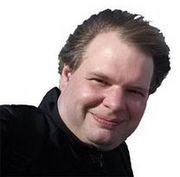Tanja Sophia Klopper (graduation March 2021)
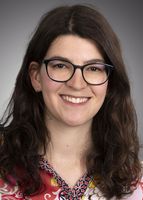
I decided to do the Master's programme in Environmental Modelling after I enjoyed mathematics and programming the most in my Bachelor's programme, Bioengineering. I did a semester abroad in Trondheim (Norway) after my Bachelor's and took a course on network theory there - I enjoyed it so much that I wanted to specialise in modelling. Since environmental protection has been close to my heart for years, I became aware of the Environmental Modelling degree programme. As a perspective after graduation, I could imagine working in environmental systems research, such as investigating how targeted interventions in the environment work in terms of environmental protection. That also sounded attractive to me in the context of a doctorate. With my background as an engineer, the Computational Science and Engineering programme was also a possibility for me, and I also applied to "Environmental Systems and Resource Management" in Osnabrück. In the end, environmental modelling convinced me because the degree programme offers a lot of flexibility in course selection and you are very free in your specialisation. I also really liked the city of Oldenburg during a short visit while passing through.
The aforementioned flexibility of the degree programme was a little overwhelming for me and many of my fellow students in the first semester. Many courses and specialisations are interesting, but it was sometimes difficult to avoid overlaps. However, it was possible to register for several courses in each semester and make a final decision later. I really liked the small courses and the resulting close contact with the teachers. Practical work and exercises were also an important part of most courses - including research work, developing your own models or presentations. I was able to expand my programming skills as I had hoped and learned a lot about scientific work. The degree programme includes three internships (two smaller projects and one large one), which can be completed both at the university and externally at research institutions or in companies. I really appreciated this freedom and took advantage of all three options. For example, I completed my large internship at Rifcon GmbH in the area of effect modelling and presented the results I obtained there in the form of a poster at the international SETAC conference (this was held digitally in 2020). My participation was funded by the university as part of "forschen@studium". I did another internship at the Helmholtz Centre Dresden-Rossendorf, after which I was able to complete my studies there with my Master's thesis. It was about battery simulations, which fitted in very well with my "energy systems" profile. Throughout my studies, I enjoyed very good supervision and could also count on the support of the lecturers in case of organisational difficulties.
After graduating, I have now decided to do a doctorate at the University of Karlsruhe. The topic has little to do with what I had in mind before my studies - I am now working on the design of a process for battery production and the development of a digital twin for process automation. This may not sound like "environmental modelling", but I can score points with many of the skills I have acquired - especially with my programming experience and routine in writing scientific papers.
Please feel free to contact me at tanjaklopper@posteo.de if you have any further questions.
Ievgen Vdovychenko (graduation November 2020)
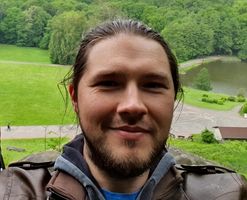
My interest in environmental processes developed while I was still in Ukraine, writing a Master's thesis in another subject, information systems. My Master's thesis at the time was on the topic of "Economics - Ecological Modelling of Operational Processes", although I only touched on ecological issues in passing. Afterwards, I gained experience in an ecological direction in my hometown Dnipropetrovsk, where I organised waste disposal and processing in a company. After all, my plan was to continue my studies in a PhD programme at some point. Since my heart had been beating for the German language for a long time, Germany is generally known for good research, and there is also intensive research on renewable energies here, the preference for the country was an easy decision in the search for PhD programmes. In the course of the search, I realised that, as a career changer, I unfortunately lacked important knowledge in the field of modelling, as well as some background knowledge on environmental systems. That's why I first decided to do another Master's programme. The corresponding search yielded two options: the University of Oldenburg or the TU Cottbus. The decisive factor was that the University of Oldenburg had a good International Student Office and a preparatory language course directly at the university. That's how I ended up in Oldenburg.
After a German course and subsequent DSH exam, which prepared me for the scientific language, I was finally able to start studying for the Master's programme in "Environmental Modelling". However, there was some confusion with the study programme for me at the beginning, as university studies in Germany and Ukraine can differ greatly in many organisational nuances. At this point, the lecturers were a great help to me. They were always open, nice and willing to help with minor questions. Above all, our subject advisor (Prof. Dr. Ulrike Feudel) helped me a lot at that time to choose the profile area. I decided on "Energy Systems" because I think energy issues are essential for our future, the corresponding market is growing rapidly and the subject area already fitted in well with my university background at the time. The courses on offer were quite exciting and so I combined both compulsory internships with it.
For those who are not from here, it is good to know that Oldenburg is a "student city". There are various research groups and institutes in the city or within easy reach (with the semester ticket for the whole of Lower Saxony, as well as to Bremen and Hamburg). Research is also being conducted in the field of wind energy directly in Oldenburg. During my studies, I was able to gain some experience at the research institutes "ForWind" and "OFFIS". I wrote my Master's thesis in industry at the company "energy & meteo systems GmbH", with Dr. Jan Freund as my university supervisor. He had already supervised several students who had written such external papers and was therefore able to help me excellently. After the Master's thesis, I was offered a full-time position in the company and now work at "energy & meteo systems" in a research department where I model power flows in electricity networks. Looking back, I find the Master's degree in environmental modelling in Oldenburg quite suitable for this, especially because of its relation to stochastic modelling and time series analysis. I still have PhD plans for my future, but I can also imagine realising them in connection with a job in industry and even know a few colleagues who have already successfully pursued such a path.
If you as future students have any questions, please do not hesitate to contact me at eugene.vdovichenko@gmail.com.
Debbora Leip (graduation October 2020)
I have always been interested in abstract mathematics on the one hand, and in sustainability and climate protection on the other. When I chose my Bachelor's degree programme, I decided on mathematics with the aim of combining my two interests in the Master's programme. Between my Bachelor's and Master's degrees, I did two internships in a gap year to get a feel for possible fields of work and to help me choose a Master's degree programme. In the process, I worked with agricultural-economic models, which was a lot of fun. I then looked for a Master's programme that would provide me with useful basic knowledge for a career in this field on the one hand, and on the other hand would correspond to my interest in mathematical solutions to abstract problems. I chose Environmental Modelling in Oldenburg.
What particularly appealed to me about the degree programme was the wide range of options and the three planned internships. This allowed me to learn theoretical aspects of modelling (e.g. "Theory of Dynamic Systems"), as well as helpful means of data analysis (e.g. "Time Series Analysis"), and applied aspects (e.g. in the seminar "Earth System science for sustainability studies" during my semester abroad in Bergen). The internships can be completed internally at the university, but also externally at companies or research institutes. I used this opportunity to work for three months at the Universidad Politécnica de Madrid in the Department of Agricultural Economics, and three months at the Stockholm Resilience Centre. I had a lot of support from the university, especially in organising my internship in Madrid, as I was funded through the Erasmus+ scholarship and there were some administrative hurdles to overcome. I was also able to complete my Master's thesis externally, at the International Institute for Applied Systems Analysis (IIASA). Through the internships and the Master's thesis, I not only learned a lot in terms of content, but was also able to develop further in general and prepare myself for professional life in research.
Overall, the degree programme met my expectations quite well and I am also very satisfied with my choice in retrospect. After graduating, I successfully applied for a PhD position at the Potsdam Institute for Climate Impact Research. My work there is very interesting, and through my studies in Oldenburg I feel well prepared for my current tasks.
If you have any further questions, you can reach me at debbora.leip@alum.uol.de.
Julian Merder (graduation December 2015)
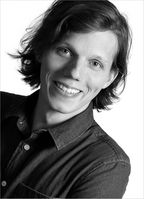
In my Bachelor's programme BioGeo-Analysis at the University of Trier, I was mainly interested in ecological questions. In a lecture on the basis of recording methods of animals and plants in the field, formulas were already listed in the first semester of the Bachelor on how to best assess the biodiversity of a place. Graphs were shown of how lynx and hare in Canada engage in a constant battle of population sizes, a pattern-building up and down, and that this could certainly be calculated. Exactly how the striking pattern came about, which is probably shown at least once in every ecology lecture, was unfortunately not the subject of the course or the focus of the Bachelor's degree, but my interest in modelling was aroused here. I have also always had a strong interest in marine biology, not least due to a longer stay in Southeast Asia, and so I wanted to pursue this direction more closely for the Master's degree.
One of my friends in Oldenburg suggested the University of Oldenburg and the ICBM to me, so that I could combine the two and of course have a few familiar faces for a beer or two in the evening. During my research, I found the Master's programmes Marine Environmental Sciences and Environmental Modelling. After reading up on the module descriptions, I decided - admittedly more on instinct - on the Environmental Modelling programme and applied. After three weeks, I already received an acceptance letter.
Here I got both the in-depth knowledge of the background of theoretical ecology that I had missed in the Bachelor's programme, as well as more comprehensive training in data analysis with the large amounts of data that had accumulated during field exercises for courses in species knowledge in the Bachelor's programme. Special highlights for me were thus, after my specialisation in the focus on process and system-oriented modelling with the courses on population dynamics and critical states in the Earth system, also the profile module Environmental Systems and Biodiversity. I found the often manageable group sizes, which allow direct contact with the lecturers, to be pleasant. I gained practical insight into the ecology of benthic species communities through a joint course with the University of Bremen and the Alfred Wegener Institute on Helgoland.
Inspired by a modelling internship in Ireland, I then researched the differences of benthic species communities on the coasts of Ireland in my Master's thesis. My work was jointly supervised by one lecturer from the ICBM and one from the University of Galway. The close cooperation with my two supervisors also enabled me to take a first step towards a scientific career by writing a scientific article as first author. After submitting the manuscript and revising it after receiving peer reviews, I am currently preparing for resubmission and - hopefully - publication in an international journal.
I am currently working at the wind power company ENERCON on the implementation of shutdown times for bat protection. Even though I can't actually apply much from my degree programme here, the modelling focus and the Matlab skills I acquired helped me a lot during the job interview. Because I definitely want to return to research, I will stay there until I find a suitable doctoral position in the marine department.
I would study this research-oriented degree programme again at any time. If you have any open questions about the degree programme, I am also happy to help at julian-merder@web.de.
Marcel Kuhmann (graduation March 2015)
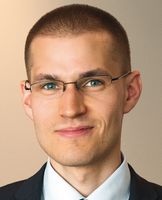
After completing my Bachelor's degree in mathematics, I decided to give more space to my interest in ecological issues. I had my sights set on future research work at a scientific institute (e.g. the Helmholtz or Fraunhofer Society) or a possible career (e.g. nature park, environmental authority) - but I did not have a clear goal in mind.
Accordingly, I looked around for non-consecutive Master's programmes that fulfilled two requirements: they should have a firm foothold in the field of mathematical and scientific methodology with a stronger application focus, and they should also offer me the chance to gain insights into a wide variety of topics. In Germany, I came across two Master's programmes that fulfilled my desired profile: the Master's in Environmental Modelling at the University of Oldenburg and the Master's in Environmental Systems and Resource Management in Osnabrück. Both programmes convinced me:
- the participation of a wide range of disciplines in the programme and the possibilities for specialisation resulting from this and from the flexible module system
- the thematic and methodical integration in the interface area of mathematics / specialisation area of computer science
- the numerous opportunities to gain valuable insights into research and development through internships, projects and student research projects
- the good contacts of the institute and the lecturers to other research institutions in Germany and abroad as a foot in the door for a semester abroad or a research internship.
The deciding factor for my enrolment in Oldenburg was a day on site when I met with students of the programme who had offered to tell me about their experiences beforehand. After the conversations and the impressions of the campus and the city in general, I had the feeling that this Master's programme was the right fit for me and that it was also a well-rounded programme; I then quickly dropped my plans to visit Osnabrück as well.
The Master's in Environmental Modelling delivered on the promised breadth of education: I was able to deal with the application of game-theoretical methods in evolutionary genetics, was present at a discussion with a head dike judge on land use in East Frisia, took part in a tour of the wind turbine manufacturer ENERCON and a wind farm, and wrote my Master's thesis on soil physics at the Helmholtz Institute for Environmental Research in Leipzig.
As a student in the Master's programme in Environmental Modelling, you enjoy excellent teaching: the lecturers are very committed to their work and the supervision ratio is very comfortable. On the other hand, you regularly have the opportunity to experience university research up close. In my opinion, the degree programme is therefore ideal as preparation for and entry into a career in research. But graduates can also enjoy very good career opportunities in business and industry; my career entry as an actuary can certainly serve as a positive example of this. I benefit daily from both the programming skills trained in the Master's programme and the statistical methods learned. Above all, however, the co-development and application of mechanistic models for the assessment and simulation of elementary risks (earthquakes, storms/hail, flooding, heavy rain) are a home game for me as a graduate in environmental modelling.
With my experience, I am happy to help you with your study decision. In case of further questions, please contact me at: marcelkuhmann@web.de

![[Translate to English:]](/f/5/_processed_/3/2/csm_ICBM-Logo-transparent-_91fe1c6774.png)
